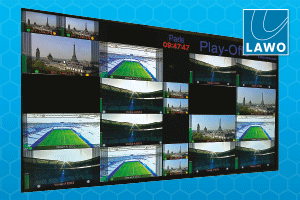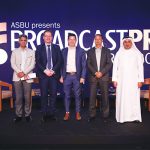The MENA regions premier broadcast industry event, the ASBU BroadcastPro ME Summit and Awards, returns with an exciting lineup of more than 30 industry speakers as they debate regional strategies for multi-screen broadcasting and explore steps towards creating sustainable business models. The one-day event will take place on November 12, 2012, at Al Andalus Ballroom, […]
 The MENA regions premier broadcast industry event, the ASBU BroadcastPro ME Summit and Awards, returns with an exciting lineup of more than 30 industry speakers as they debate regional strategies for multi-screen broadcasting and explore steps towards creating sustainable business models.
The MENA regions premier broadcast industry event, the ASBU BroadcastPro ME Summit and Awards, returns with an exciting lineup of more than 30 industry speakers as they debate regional strategies for multi-screen broadcasting and explore steps towards creating sustainable business models.
The one-day event will take place on November 12, 2012, at Al Andalus Ballroom, Habtoor Grand Beach Resort and Spa, Dubai.
Following the success of the inaugural ASBU BroadcastPro Summit and Awards in 2011, the 2012 edition will offer the regional broadcast industry that is grappling with disruptive politics and technologies, a broader platform for debate.
Dr. Riyadh Najm, vice president of the Arab States Broadcasting Union (ASBU) and minister of Information Affairs, Ministry of Culture and Information, Saudi Arabia will welcome delegates to the summit.
Held concurrently with the annual BroadcastPro Awards gala, the summit is expected to host 300 senior level executives from across the region with some executives flying in for the one-day event from Europe and USA.
The summit agenda reflects a viewership that has become increasingly mobile with growing preference to view content on multiple devices.
Broadcast and IT: Exploring the link
Experts representing major broadcasters including MBC, Sky News Arabia, Dubai Media INC, twofour54, Salam MediaCast and EMC/isilon will deliberate on the processes implemented by broadcasters moving to file-based operations. The panel discussion will highlight the latest developments in cloud computing technologies and their use for broadcast media management. From cost-effective and efficient options for storing, protecting and distributing content, to successfully managing multi-platform distribution workflows, the attendees will gain from proven regional case-studies. As different technologies converge on to a single TV platform, participants on the panel discussion will study advancements in MXF file mastering, the challenges of implementing a cross-media platform and the use of an Enterprise Service Bus appropriate SOA.
With more than 500 free-to-air channels, the MENA TV industry is growing exponentially. Industry insiders will explore in the second panel discussion the key issue of Multi-platform Delivery.
We have a mix of panelists from amongst end users and manufacturers to discuss the standards being adopted to deliver content across different platforms, commented Vijaya Cherian, Group Editor of the Broadcast Division at CPI.
The aim of this discussion is to look at what multi-platform delivery entails in terms of content, technical infrastructure and other related challenges and offer solutions on how broadcasters can move beyond their traditional offerings.
Telcos and broadcasters in a crowded online video environment
Are broadcasters and telcos stepping on each others toes? Panelists will closely examine broadcasters strategies for channel distribution versus direct to the consumer. Industry watchers say that manufacturers will produce more than 70 million broadband connected TV sets worldwide by 2014 as viewers migrate to new technologies. This debate will also look at how telcos and broadcasters can work together to maximise the monetisation opportunities of multi-screen offerings.
Establishing a sustainable business model for Middle East TV
CEOs from other leading broadcasters will attempt to answer the knotty question: Can there be a sustainable business model for Middle East TV? Promising to be a contentious panel discussion, topics will highlight the discrepancies in regional advertising rates as compared to international rates and the limited spread of subscription TV. While the impact of the second screen on broadcasters will be examined, hard questions will be asked on whether enough is being done to generate more financial value from Arabic content.
Over the Top Technology (OTT) delivery is no longer a luxury as viewers have come to accept watching content on tablets and mobile devices as a given. Traditional broadcasters who have been reluctant to make the shift or have not embraced the change wholeheartedly, thus far, must be willing to revisit their existing strategies and adjust their business model to suit the requirements of the new age. This event been designed to provide opportunities to the regions broadcast professionals to learn and make that shift, added Cherian.

















































































